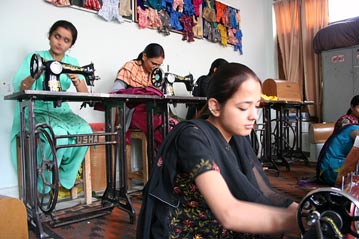Afghan minority seeks home in India
Afghan minority seeks home in India

NEW DELHI, India, December 13 (UNHCR) - Mention Afghan refugees, and most people think of the ethnic Pashtuns in Pakistan or the Tajiks and Hazaras in Iran. But beyond Afghanistan's neighbouring countries, an Afghan minority is thriving in India through self-help and government support.
India is home to some 9,200 Afghan refugees, among them 8,500 Hindus and Sikhs who call the country their ancestral homeland.
"Our ancestors first went to Afghanistan during the time of King Ranjit Singh in Lahore [during the 19th Century], when it was still part of India. Many others fled from Lahore to Afghanistan during partition in 1947 as it was unsafe to go back to India," explained Manohar Singh, a founder member of the Khalsa Diwan Welfare Society for Afghan Hindus and Sikhs in the Indian capital, New Delhi.
In eastern Afghanistan, the community had farm lands, vineyards, big houses and a thriving business community. "We were just 2 percent of the population in Jalalabad, but we controlled a large part of the economy," recalled Singh.
However, they were forced to flee Afghanistan as early as 1978. "Some of our elders left during the communist regime. Others from places like Laghman and Ghazni left in the early 1990s under the mujahideen," he added, noting that they lost 95 percent of their property. "I returned to Jalalabad in 1993 to check on my land but found it occupied by warlords. I was forced to give it up."
Today, Singh is an active part of his community in India. When not tending to his electronics business, he works at the Khalsa Diwan Welfare Society to empower Afghan Hindus and Sikhs. The society provides skills training and financial assistance and is funded by 550 Afghan shopkeepers and factory owners through monthly contributions. The staff are volunteers and the services are free.
At Khalsa Diwan's centre in West Delhi, the community has taken over computer classes previously funded by UNHCR. Four such classes are offered daily for different ages and levels. Graduates from the course teach other students about word processing, Excel spreadsheets and desktop publishing.
Sewing classes supply manpower to tailor shops in the neighbourhood. Among the apprentices is Simran, 20, who came to Delhi when she was four years old. "I make clothes for my family, not for sale," she said. "I got married recently. My husband is in Germany and I hope to join him soon."
Khalsa Diwan also pays the fees of 680 needy students in 28 local schools in West Delhi. Those who need extra help can attend after-school tuition and English-language classes, some of them taught by DAFI scholars funded by the German government. "Are there schools in Afghanistan?," one of the girls asked. Half the class was born in India and has never seen Afghanistan.
And they probably never will. "I often dream that I'm still in Jalalabad," said Singh, now a father of four daughters and a son. "But the situation is very bad, women can't even go out. How can we return?"
Thankfully, there's a solution in sight. The Indian government has agreed that after 12 years of residency - the standard under the citizenship law - Afghan Hindu and Sikh refugees can apply for Indian citizenship.
The authorities also agreed in 2005 on certain mechanisms to facilitate this process. Over 120 Afghan Hindus and Sikhs have so far been naturalized and another 4,000 have expressed interest.
Khalsa Diwan helps to refer interested parties to UNHCR's implementing partner, the Socio-Legal Information Centre (SLIC), which runs three centres in Delhi to counsel the refugees, fill in forms and follow up on naturalization procedures. It's a long process, but SLIC hopes that all eligible Afghan Hindus and Sikhs would have lodged their applications by the end of 2008 and that Indian citizenship can be acquired shortly afterwards.
Thanks to the authorities' support and the community's strong self-help spirit, this Afghan minority may finally be able to find a durable solution and a lasting home in India.
By Vivian Tan in New Delhi, India








